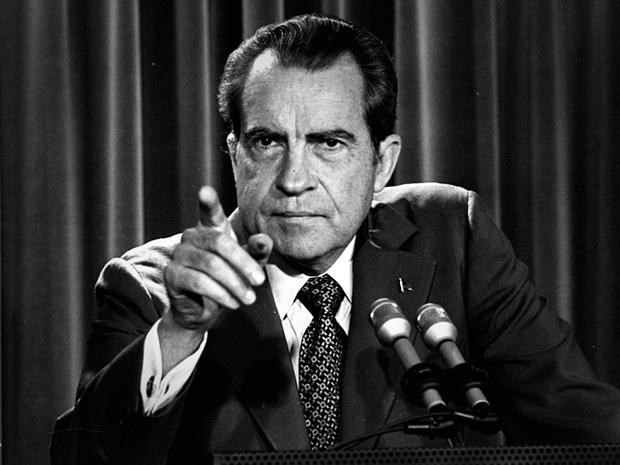Nixon: Gap in tapes was an "accident"
The legacy of President Richard Nixon is one of history's most documented. Today, four months after a judge ordered the release of Nixon's grand jury testimony in the Watergate cover-up trial, the transcript was made public.
Throughout his two-day session with the attorneys in June 1975, the former president is reluctant, wary of entrapment, sometimes impatient, occasionally self-pitying -- but always insistent that he acted responsibly.
Among the subjects covered, the infamous 18 1/2 minute gap in an Oval Office tape recording of a conversation between the president and his chief of staff Bob Haldeman three days after the break-in at the Watergate headquarters of the Democratic Party.
The former president says he "practically blew my stack" when he learned of the gap - not so much because of the missing information as the fact that the prosecutors even had the tape.
He testifies that he told his chief of staff, General Alexander Haig, "let's find out how this damn thing happened," and adds later than in his view, "it is very simple...it was an accident."
In another part of his testimony, Nixon says a Vietnam peace initiative would have come sooner if the New York Times had not published the Pentagon Papers, saying "the ending of a war and the killing of Americans was delayed."
The Nixon Library also released more audio material today. It includes his recollection, dictated a few hours later, of a totally-out-of-character moment - his visit to protesters at the Lincoln Memorial.
Early on May 9, 1970, just days after students protesting the Vietnam War were shot by National Guardsmen at Kent State, Nixon paid an impromptu pre-dawn visit to the memorial.
He recalls the small group of 8 or 10 people growing larger, and beginning to engage him:
"One spoke up and said 'I hope you realize we are willing to die for what we believe in.' I said I... can certainly realize that, if you realize that many of us when we were your age were also willing to die for what we believed in... We were trying to build a world in which you will not have to die for what you believe in, in which you are able to live for."
Nixon told the protesters he too had searched for answers.
"I just wanted to be sure that all of them realized that ending the war and cleaning up the safe streets and air and water was not going to solve the spiritual hunger which all of us have and has been the great mystery of life from the beginning of time."
As morning dawned, he told them he had to leave, but paused to pose for a picture with a man he described as "a bearded fellow from Detroit."
"I knew he had come a long way for this event, that he too that he and his colleagues were terribly frustrated and angry about our policy and approach to it. And I said I just hope your opposition doesn't turn to a blind hatred of the country. Remember this is a great country for all of its faults."
Then, saying he thought the Secret Service was becoming concerned, Richard Nixon and the protesters went their separate ways.
You can listen to a portion of the tapes below:
